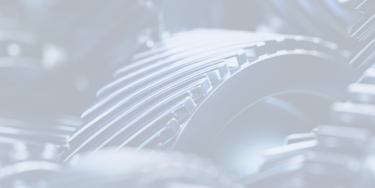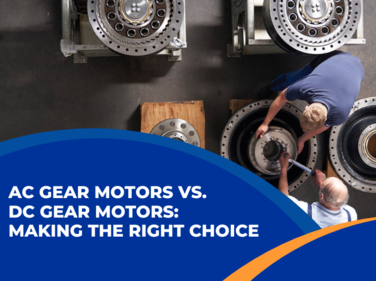
AC Gear Motors vs. DC Gear Motors: Making the Right Choice

When it comes to power transmission, gearmotors play a crucial role in many applications, from manufacturing to robotics. However, with so many options available, choosing the right type of gearmotor for your needs can be difficult. Two of the most common types of gearmotors are AC and DC gearmotors, each with their own advantages and disadvantages. In this article, we'll provide a comprehensive guide to the differences between AC and DC gearmotors, including their key features, common applications, and performance characteristics. Plus, we'll explain why Sumitomo is the best gearbox manufacturer for your needs and provide a call to action to choose their gearmotors for your application.
What is an AC Gear Motor?
AC gear motors are electrical devices that use alternating current (AC) to drive the motor. They are often used in industrial applications requiring constant speed and are commonly found in conveyor systems, pumps, and compressors. AC gearmotors have several advantages over other types of gearmotors, such as:
- High reliability and durability
- Low maintenance requirements
- Smooth and quiet operation
- Energy efficiency
However, AC gearmotors also have some disadvantages, such as their limited speed control and their tendency to overheat at high loads. Considering these factors is essential when choosing an AC gearmotor for your application.
Sumitomo AC gear motors are designed to provide high reliability and efficiency, low maintenance requirements, and a long lifespan. Plus, our gearmotors are built to the highest quality standards, ensuring that they will perform reliably even in the most demanding applications. At Sumitomo, we offer a wide range of AC gearmotors to meet your specific needs.
If you're looking for an AC gearmotor, Sumitomo is the best choice for your needs. Contact us today to learn more about our products and services.
What is a DC Gear Motor?
DC gearmotors use direct current (DC) to power the motor, making them a popular choice for applications that require precise speed control or frequent starting and stopping. They are commonly used in automotive, robotics, and medical equipment, among other applications. DC gearmotors have several advantages over other types of gearmotors, such as:
- High torque and power output
- Precise speed control
- Good starting and stopping capabilities
- Compact size and lightweight design
However, DC gearmotors have disadvantages, such as higher costs, more complex control systems, and higher maintenance requirements.
Key Differences Between AC Gear Motors and DC Gear Motors
While AC gear motors and DC gearmotors share some similarities, they also have some key differences that make each one better suited for certain applications. Here are some of the key differences between AC and DC gearmotors:
- Power: DC gear motors tend to have higher torque and power output than AC gearmotors. This is due to the fact that DC gearmotors use a commutator to switch the current direction, which allows for more efficient use of the magnetic field. This makes DC gearmotors ideal for applications that require high performance, such as robotics or heavy machinery. AC gearmotors, on the other hand, are better suited for applications that require constant speed, such as conveyor systems or pumps.
- Efficiency: AC gear motors are generally more energy-efficient than DC gearmotors. This is because AC gearmotors do not require a commutator, which can cause energy loss due to friction and heat. Additionally, AC gearmotors can be designed to run at higher speeds, which reduces the need for gearing and improves efficiency. This makes AC gearmotors a better choice for applications that require constant speed and high efficiency.
- Speed control: DC gearmotors offer more precise speed control than AC gearmotors. This is because DC gearmotors can be easily controlled by adjusting the voltage or current. This makes DC gearmotors a better choice for applications that require precise control, such as medical equipment or robotics. AC gearmotors can also be controlled but typically require more complex control systems and may not offer the same level of precision.
- Cost: DC gearmotors tend to be more expensive than AC gearmotors. This is due to the fact that DC gearmotors require more complex control systems, such as motor controllers and feedback devices, which can add to the cost. Additionally, DC gearmotors require more maintenance than AC gearmotors, such as brush replacement and commutator cleaning. This makes AC gearmotors a more cost-effective choice for applications that do not require the high performance and precision of DC gearmotors.
In conclusion, choosing the right gearmotor for your application is crucial for ensuring optimal performance and reliability. AC and DC gearmotors each have their own advantages and disadvantages, and it's important to consider these factors when making your decision.
For applications that require high performance and precision, such as robotics or heavy machinery, DC gearmotors may be the best choice. DC gearmotors offer high torque and power output and precise speed control, making them ideal for these types of applications. However, DC gearmotors are generally more expensive than AC gearmotors and require more maintenance due to their more complex control systems.
For applications that require constant speed and high efficiency, such as conveyor systems or pumps, AC gearmotors are often the better choice. AC gearmotors are more energy-efficient than DC gear motors and can be designed to run at higher speeds, which reduces the need for gearing and improves efficiency. AC gearmotors are also more reliable and require less maintenance than DC gearmotors.
At Sumitomo, we offer a range of high-quality AC gear motors and DC gearmotors to meet your specific needs. Our expert team can help you choose the right gearmotor for your application based on your power, efficiency, speed control, and cost requirements. Plus, our gearmotors are built to the highest quality standards, ensuring that they will perform reliably even in the most demanding applications.
Contact us today to learn more about our products and services and start optimizing your power transmission system with Sumitomo gearmotors. With our expertise and high-quality products, you can ensure optimal performance and reliability in your application.
About Sumitomo Drive Technologies
At Sumitomo Drive Technologies, we work hand-in-hand with our customers to ensure that their industrial gearboxes, speed reducers, and accessories remain operational for years to come. Many of our products have been in high-speed and harsh environments for years. Clients switch to Sumitomo to experience that durability and decrease the amount of unscheduled downtime and maintenance in their facility. We ensure that every unit we design or repair leaves our Unites States facilities quickly to keep your application up and running. Please call us at 1.800.762.9256 or contact us by email to receive a quote for your facility or information about our industrial gearbox repair services. We will gladly tell you more about our products and connect you to a representative in your area.